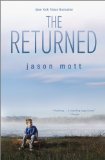Summary | Excerpt | Reviews | Beyond the Book | Readalikes | Genres & Themes | Author Bio

One
HAROLD OPENED THE door that day to find a dark-skinned man in a well-cut suit smiling at him. At first he thought of reaching for his shotgun, but then he remembered that Lucille had made him sell it years ago on account of an incident involving a traveling preacher and an argument having to do with hunting dogs.
"Can I help you?" Harold said, squinting in the sunlight—light which only made the dark-skinned man in the suit look darker.
"Mr. Hargrave?" the man said.
"I suppose," Harold replied.
"Who is it, Harold?" Lucille called. She was in the living room being vexed by the television. The news announcer was talking about Edmund Blithe, the first of the Returned, and how his life had changed now that he was alive again.
"Better the second time around?" the announcer on the television asked, speaking directly into the camera, laying the burden of answering squarely on the shoulders of his viewers.
The wind rustled through the oak tree in the yard near the house, but the sun was low enough that it drove horizontally beneath the branches and into Harold's eyes. He held a hand over his eyes like a visor, but still, the dark-skinned man and the boy
were little more than silhouettes plastered against a green-and-blue backdrop of pine trees beyond the open yard and cloudless sky out past the trees. The man was thin, but square-framed in his manicured suit. The boy was small for what Harold estimated to be about the age of eight or nine.
Harold blinked. His eyes adjusted more.
"Who is it, Harold?" Lucille called a second time, after realizing that no reply had come to her first inquiry.
Harold only stood in the doorway, blinking like a hazard light, looking down at the boy, who consumed more and more of his attention. Synapses kicked on in the recesses of his brain. They crackled to life and told him who the boy was standing next to the dark-skinned stranger. But Harold was sure his brain was wrong. He made his mind to do the math again, but it still came up with the same answer.
In the living room the television camera cut away to a cluster of waving fists and yelling mouths, people holding signs and shouting, then soldiers with guns standing statuesque as only men laden with authority and ammunition can. In the center was the small semidetached house of Edmund Blithe, the curtains drawn. That he was somewhere inside was all that was known.
Lucille shook her head. "Can you imagine it?" she said. Then: "Who is it at the door, Harold?"
Harold stood in the doorway taking in the sight of the boy: short, pale, freckled, with a shaggy mop of brown hair. He wore an old-style T-shirt, a pair of jeans and a great look of relief in his eyes—eyes that were not still and frozen, but trembling with life and rimmed with tears.
"What has four legs and goes 'Boooo'?" the boy asked in a shaky voice.
Harold cleared his throat—not certain just then of even that. "I don't know," he said.
"A cow with a cold!"
Then the child had the old man by the waist, sobbing, "Daddy! Daddy!" before Harold could confirm or deny. Harold fell against the door frame—very nearly bowled over—and patted the child's head out of some long-dormant paternal instinct. "Shush," he whispered. "Shush."
"Harold?" Lucille called, finally looking away from the television, certain that some terror had darkened her door. "Harold, what's going on? Who is it?"
Harold licked his lips. "It's…it's…"
He wanted to say "Joseph."
"It's Jacob," he said, finally.
Thankfully for Lucille, the couch was there to catch her when she fainted.
Jacob William Hargrave died on August 15, 1966. On his eighth birthday, in fact. In the years that followed, townsfolk would talk about his death in the late hours of the night when they could not sleep. They would roll over to wake their spouses and begin whispered conversations about the uncertainty of the world and how blessings needed to be counted. Sometimes they would rise together from the bed to stand in the doorway of their children's bedroom to watch them sleep and to ponder silently on the nature of a God that would take a child so soon from this world. They were Southerners in a small town, after all: How could such a tragedy not lead them to God?
Excerpted from The Returned by Jason Mott. Copyright © 2013 by Jason Mott. Excerpted by permission of Mira. All rights reserved. No part of this excerpt may be reproduced or reprinted without permission in writing from the publisher.
The single biggest problem in communication is the illusion that it has taken place
Click Here to find out who said this, as well as discovering other famous literary quotes!
Your guide toexceptional books
BookBrowse seeks out and recommends the best in contemporary fiction and nonfiction—books that not only engage and entertain but also deepen our understanding of ourselves and the world around us.